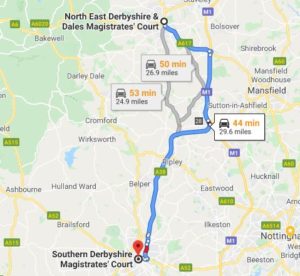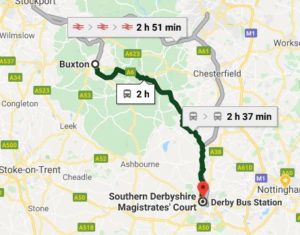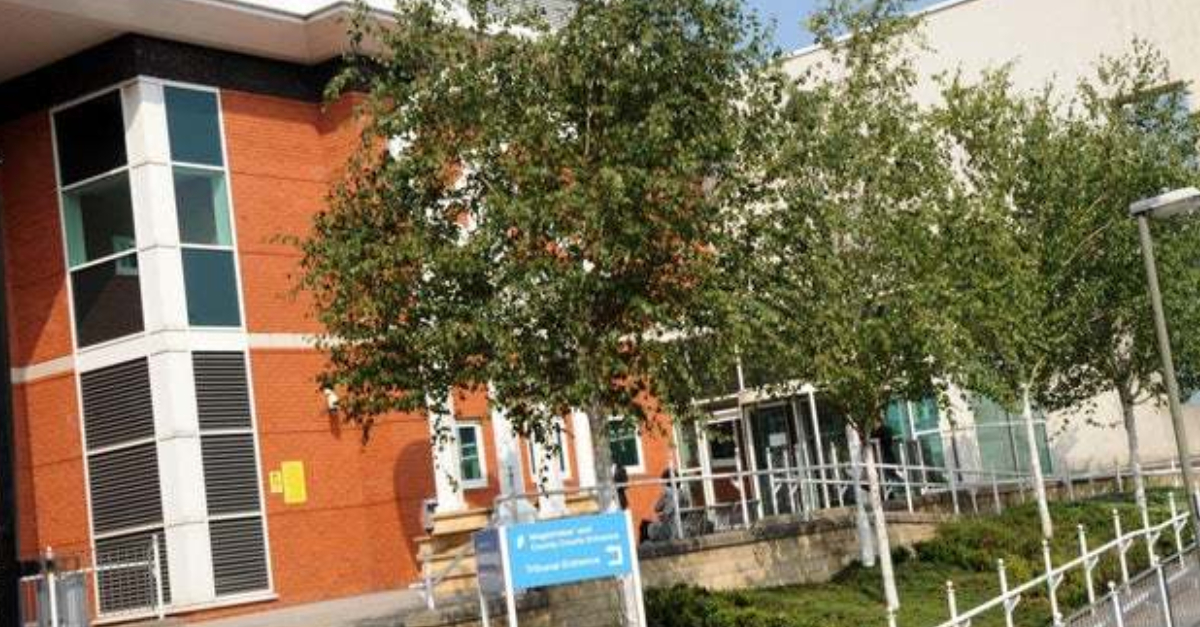Monthly Archives: January 2020
A meeting is to be held on 3rd February 2020 to obtain views from ‘stakeholders’ about a plan to move the remand court at Chesterfield Magistrates’ Court to Derby Magistrates’ Court instead.
It is suggested that a low volume of prisoners mean that it will be a better use of Court resources to transfer prisoners away from their ‘home’ court and to a court room nearly an hour away, door to door by car, or 30 miles.
We have some concerns, however, that all might not be what it seems. For example, custody cases are often dealt with as part of a general plea list rather than in a specific custody court. Additionally the court has itself reduced custody cases by allowing those subject to warrants surrendering themselves to the court rather than to the police station and then the cells.
A steady trend
The process of court closures started years ago with a procession of court closures across the country. In this area we have lost Ashbourne, Matlock, Glossop, Swadlincote and Buxton for example.

We retain offices in both Ilkeston and Newark, even though there is no longer a court or custody suite for processing prisoners in either town.
It is hard to believe that this isn’t the first step in a ‘rationalisation’ that will see all Chesterfield Magistrates’ Court work moved to Derby. For example, if there are no longer staff in the cells to deal with remand prisoners, how can a defendant be sentenced to custody at Chesterfield, or how can a custody trial be dealt with?
Case by case more work will be removed from the court until it is declared ‘inefficient’ by HMCTS and then closed, even though it is HMCTS that has rendered a court ‘redundant’. This pattern is seen over and over again.
Entirely unsurprising?
This ‘need’ for efficiency is a direct result of the court in Chesterfield lacking staff. Since October 2019 Chesterfield Magistrates’ Court has lost 2 legal advisers on top of the 2 lost in the preceding 18 months.
Flexible working means a further 3 days have been lost as a legal adviser has been permitted to reduce from full-time to 2 days a week.
A further legal adviser has been seconded to Stafford for a ‘project’.
Salary and conditions, including the removal of most admin staff, resulting from austerity measures make the court service far less attractive than 15 or 20 years ago so there is inevitably a difficulty in recruiting.
Separately, legal advisers are no longer contractually obliged to cover Saturday or other occasional courts. As a result it was difficult for the courts to keep sitting over the Christmas period.
While we understand that trainees are being recruited this can only be a partial solution in the medium term. It seems unlikely that the Ministry of Justice will ever fund adequate staff or pay levels.

In the meantime, this failure on behalf of the court service will be subsidised by the defendant and their families, solicitors and other court users.
Where is the defendant in all this?
While prisoners will have the dubious advantage of free transportation to Derby from the police station, they will be less fortunate on the return journey should they be released on bail or because they are sentenced to a community penalty.
 And of course this plan will not just affect Chesterfield residents. Chesterfield Magistrates’ Court also serves those communities even further afield such as High Peak. They already face the prospect of being brought before a Magistrates’ Court in Manchester, and may now be expected to find their way back from Derby. While only a little over an hour in a car, on public transport the journey is at least two hours.
And of course this plan will not just affect Chesterfield residents. Chesterfield Magistrates’ Court also serves those communities even further afield such as High Peak. They already face the prospect of being brought before a Magistrates’ Court in Manchester, and may now be expected to find their way back from Derby. While only a little over an hour in a car, on public transport the journey is at least two hours.
A bail application is perhaps one of the most important hearings that a defendant will have. Understandably their family may wish to attend in support. Family may be in a position to provide an address, or surety, or useful information about the health of mental well-being of a defendant. They will have to be able to afford and make the journey to court and back if they wish to offer that support and input.
Vulnerable defendants may suddenly find themselves alone.
Additionally we assume that the court thinks that it doesn’t matter that there will be an increased likelihood that defendants will be kept in police cells over night, as the cut off time for getting a client into a remand court will inevitably be earlier than before.
And what of the solicitors?
Everybody knows that margins under legal aid are slim, and that many firms operate with marginal profitability. Fixed fees are paid sometimes with, and sometimes without, travel time as an extra payment. In any event, the hourly rate for travel does not permit any profit element.
The change will mean that for solicitors based in Chesterfield, instead of travelling to their local court they will now have to travel to Derby with a risk of no payment, or no profitable payment, being made. More time will be spent at a loss, and employers will have to compensate staff for the travel expense in any event.
For example, one of our solicitors will face an hour’s journey, more than double the travel time they currently undertake.
An additional cost will also have to be absorbed. To be at court at a reasonable time solicitors will have to set off earlier. Who pays for that in terms of salary? Does it need a change in contractual hours? Will the job remain as ‘attractive’ with additional travel in rush hour built in?
What of those solicitors with child care responsibilities who can currently juggle them successfully as they are always at their ‘home court’? Extra travel at the beginning and the end of the working day will frustrate existing arrangements.
Firms and individuals will bear more costs for the same level of fees. If firms are no longer viable, what will be the effect on access to justice for those local to Chesterfield?
No doubt a new and confusing duty scheme will be imposed on the profession as well…

And everybody else…
Nobody might notice the extra car on the road between Chesterfield and Derby every day but they will be there.
If expenses and travel are paid there will be the extra cost to the tax payer through the Legal Aid Agency.
Will the court be able to send people to prison? Will there be custody staff in the cells waiting for new arrivals? Will those sentenced to custody be placed on trust to wait to be taken away, or chained to radiators? (Both of the latter have been tried in the past at other local courts).
Ultimately a court closure will cost not only solicitors and their clients, but also the police and witnesses in terms of time and lost opportunities to use their time better.
Any closure will also provide witnesses with an opportunity to travel on the same bus or train to court that a defendant is having to catch.
Austerity over?
Despite announcements to the contrary it appears that there is little interest from government in properly funding the justice system.
 Proposals like this that prioritise convenience to the court over the inconvenience and cost to every other ‘stakeholder’ simply show that the powers that be are not listening or interested in the knock on effects.
Proposals like this that prioritise convenience to the court over the inconvenience and cost to every other ‘stakeholder’ simply show that the powers that be are not listening or interested in the knock on effects.
A formal consultation will no doubt follow the meeting, and that consultation will inevitably produce a number of responses from all of those involved that suggest, with evidence, that this is a bad idea. There is always a belief that these changes will then inevitably take place despite these contributions. This will be particularly true in this case where the court service have simply been unable to recruit adequate staff.
Maybe this time it will be different?
Monthly Archives: January 2020
Covert Filming of Sexual Activity or Voyeurism
In 2015 Emily Hunt complained to the police that she had been raped in a hotel room. She had also been filmed, naked and asleep, without her consent. Although she is entitled to anonymity, she waived that right to draw attention to her case.
The Crown Prosecution Service did not authorise any charge, either for rape or voyeurism. Emily maintained that any sexual activity was not consensual but did not challenge the Prosecution decision not to charge the man with rape.
She did, however, suggest that the decision in relation to the voyeurism charge was wrong.
Definition of voyeurism
A person commits the offence of voyeurism if:
- for the purpose of obtaining sexual gratification, he observes another person doing a private act, and
- he knows that person does not consent to being observed for his sexual gratification.
In Emily’s case, the man accepted he had filmed her “in case he wanted to masturbate at some point”. It was also conceded that there was evidence he had filmed her without her consent.
Under the victim’s right of review procedure, Emily challenged the decision not to prosecute the man for voyeurism. The Prosecution upheld their original decision saying that a consensual sex act would involve a person observing your naked body and that the observation could extend to filming.
Judicial review of the decision
Emily applied for a judicial review of the decision, submitting that errors of law were made by the prosecution in making this decision.
In particular, it was argued that the Crown Prosecution Service wrongly treated the question of whether Emily consented to the sex as being decisive of the question of whether she was doing a private act when she was subsequently filmed naked and asleep.
The focus was wrongly on whether she had a reasonable expectation of privacy rather than whether she was doing a private act. It was also argued that it was wrong to say that non-consensual filming of a sleeping person when naked is not really different, in terms of privacy, to being observed asleep when naked.
The real issue was the correct approach to the phrase “doing a private act”.
Outcome of the review
The Court of Appeal has now ruled that anyone who films a partner, during sex, without their permission is committing the offence of voyeurism. This decision was made in the case of a man who filmed himself having sex with prostitutes. Tony Richards had argued that he was allowed to film as a bedroom could not be a private place if he was lawfully present.
Richards appealed against his conviction on two charges of voyeurism. Unusually, Emily Hunt was given permission to intervene in the hearing. She was allowed to put forward the submission that consent should be the primary issue in these cases.
Richards argued that the issue could not be consent when the place where the offence occurred was shared with another person. The test, according to him, was whether the person had a reasonable expectation of privacy. Richards accepted that filming without consent was a “betrayal of trust” but not that it was an illegal act.
On dismissing the appeal, it was said “a defendant can be guilty of an offence of voyeurism even when he is a participant (in relation to having sex) … section 67 of the Act which protects individuals against the recording of any person involved in a private act is not limited to protecting the complainant from someone not present during the act.”
The Crown Prosecution Service subsequently confirmed that they would be reviewing their position in respect of Emily’s judicial review. A spokesperson said “what constitutes a ‘private act’ for the purposes of the offence of voyeurism had never been conclusively defined by a higher court” until the case of Richards.
It was later said, by the Centre for Women’s Justice who supported Emily’s campaign, that the Crown Prosecution Service was no longer resisting the judicial review and would look again at the decision not to prosecute.

What to do if you are accused of voyeurism
Voyeurism is a serious offence that can be dealt with at the Magistrates’ Court or the Crown Court. It carries a maximum sentence of 2 years’ imprisonment.
A conviction can also lead to notification requirements under the Sexual Offences Act 2003 and restrictions on working with children or vulnerable adults.
The consequences of a conviction can, therefore, be far reaching.
If you are arrested or know that the police wish to speak to you about an allegation such as voyeurism, make sure you insist on your right to free and independent legal advice.
The advantages of such early advice legal advice can be found here.
If you have already been interviewed or face court proceedings we can still make a real difference to the outcome of your case.
You can read more about how we prepare such a case for trial here.
Legal aid may well be available to fund your defence at court.
We have offices across the East Midlands and will happily travel across the country to provide representation for all football related offences.

Alternatively you can contact us using the form below.


